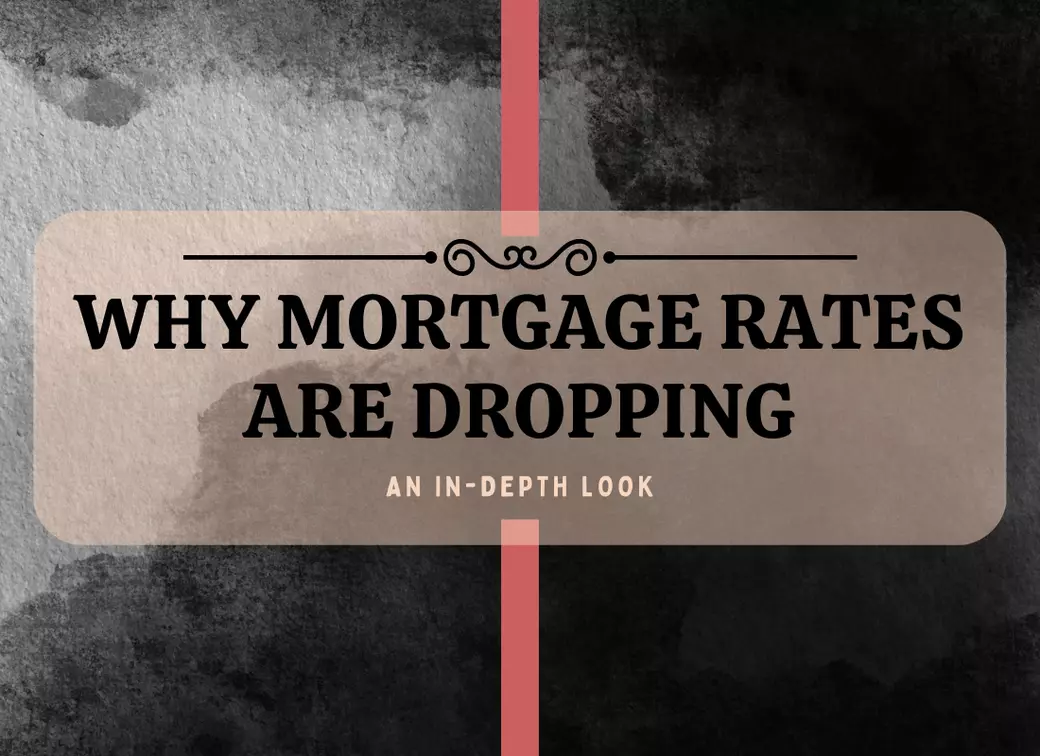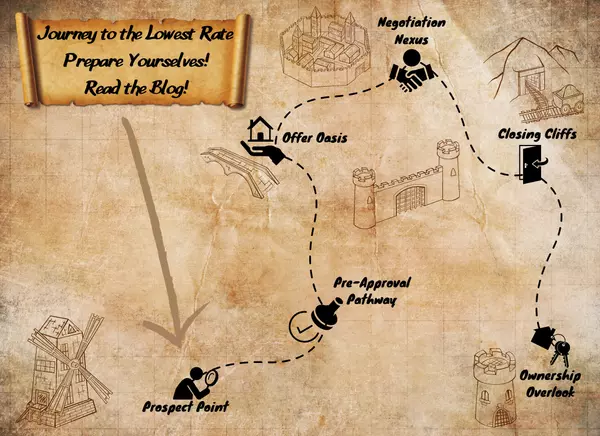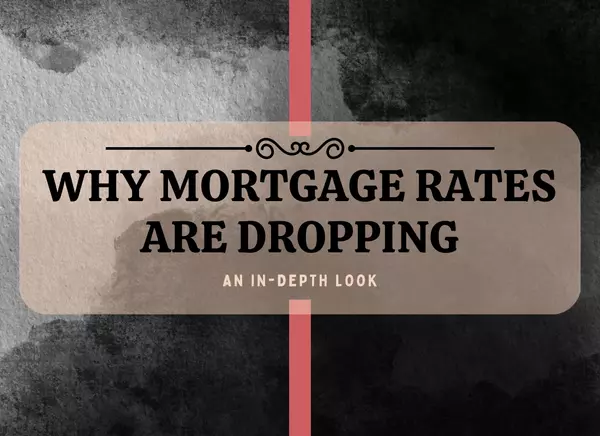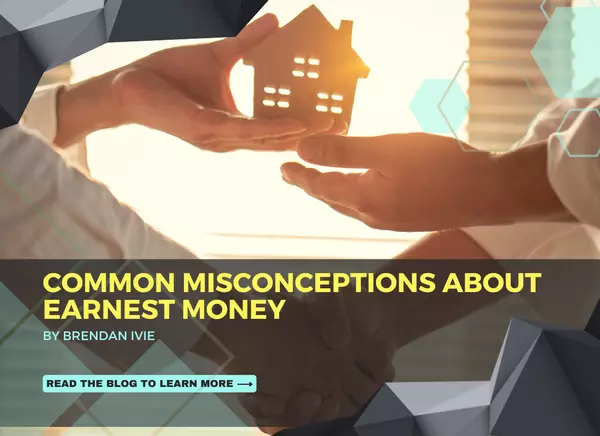Why Mortgage Rates are Dropping: An In-Depth Look

Why Mortgage Rates are Dropping: An In-Depth Look
Mortgage rates have been on a steady decline, sparking interest among potential homebuyers and those looking to refinance. Understanding the reasons behind this trend and what to expect going forward can help you make informed decisions. This blog post explores the factors contributing to the drop in rates, strategies you can implement, and what to look out for as we move through 2024.
Economic Factors Influencing Mortgage Rates
Federal Reserve Policies
The Federal Reserve's actions are crucial in shaping mortgage rates. Recently, the Fed has signaled potential rate cuts due to cooling inflation and economic uncertainty. According to Fox Business, the Fed is expected to cut rates by 25 basis points in September, which has already influenced lower rates. When the Federal Reserve lowers interest rates, it becomes cheaper for banks to borrow money, which often translates to lower rates for consumers.
Inflation Rates
Inflation is a key factor that directly influences mortgage rates. When inflation rates are lower, it means that the value of money remains stable over time. This stability encourages lenders to offer lower rates to borrowers. This is because lenders are more confident that the money they lend out will retain its value in the future.
As inflation keeps going down, the Federal Reserve (Fed) becomes more confident in its ability to maintain its target inflation rate of 2%. This confidence in maintaining stable inflation levels boosts the likelihood of the Fed implementing further rate cuts. Lower interest rates make borrowing more affordable, which can stimulate economic activity and encourage individuals to invest in homes.
Overall, the relationship between inflation and mortgage rates is complex and interconnected. Lower inflation rates can lead to lower mortgage rates, which can in turn impact the housing market and overall economy. Keeping an eye on inflation trends can help borrowers make informed decisions about when to lock in a mortgage rate.
Economic Uncertainty
Economic uncertainty can arise from a variety of sources, such as trade disputes, political instability, or fluctuations in the stock market. When investors become wary of the potential risks associated with these uncertainties, they often turn to government bonds as a safe haven for their money. This surge in demand for bonds causes their prices to rise and their yields to fall.
Yields on government bonds are inversely related to their prices, meaning that as demand increases and prices rise, yields decrease. Since mortgage rates are closely tied to the yields on government bonds, this decrease in bond yields leads to a corresponding decrease in mortgage rates.
Lower mortgage rates present an attractive opportunity for borrowers looking to purchase a home or refinance their existing mortgage. With lower rates, borrowers can save money on their monthly mortgage payments or potentially afford a more expensive home. This can stimulate the housing market and encourage more people to invest in real estate.
Overall, economic uncertainty can have a significant impact on the financial markets and interest rates. By understanding how these factors are interconnected, investors and borrowers can make informed decisions to navigate through uncertain economic times.
Housing Market Dynamics
Supply and Demand
The housing market's supply and demand dynamics significantly influence mortgage rates. Currently, many areas are experiencing a housing shortage, prompting lenders to offer competitive rates to attract buyers. Additionally, home price growth has moderated, and housing inventory has increased, making the market more appealing to potential buyers.
Home Sales and Refinancing Activity
Increased home sales and refinancing activity can drive mortgage rates down. As more people buy homes or refinance their mortgages, lenders benefit from higher business volumes and can afford to offer lower rates. This competition ultimately benefits borrowers by providing access to lower mortgage rates.
Global Economic Trends
International Trade and Investment
Global economic trends, including international trade and investment flows, influence mortgage rates. Stability in the global economy generally leads to lower mortgage rates as investor confidence increases. For example, changes in foreign investment patterns or trade policies can affect overall economic stability and, consequently, interest rates.
Central Bank Policies Worldwide
Policies implemented by major central banks, such as the European Central Bank or the Bank of Japan, can create ripple effects in the global financial markets. These effects often contribute to lower mortgage rates in the United States, as seen with recent rate cuts by various central banks to stimulate their economies.
Technology and Efficiency in the Lending Industry
Advances in Technology
Technological advancements have streamlined the mortgage application and approval process. Online platforms and automated systems have reduced the cost of processing loans, enabling lenders to offer lower rates. These efficiencies benefit both lenders and borrowers by providing quicker and more affordable financing options.
Increased Competition Among Lenders
The rise of online mortgage lenders has increased competition in the industry. Traditional banks and FinTech companies compete by offering competitive rates and innovative loan products. This competition drives down mortgage rates, giving borrowers more choices and better deals.
What to Expect Going Forward into 2024
Predictions for Mortgage Rates
Experts predict that mortgage rates will remain relatively low throughout 2024, influenced by the Federal Reserve's actions and ongoing economic conditions. According to Forbes, as the Fed continues to manage inflation and economic growth, further rate cuts are likely, which will keep mortgage rates low.
Strategies for Homebuyers and Homeowners
- Lock in Rates: With rates expected to remain low, consider locking in a mortgage rate now to take advantage of current conditions.
- Refinance: If you have an existing mortgage, refinancing at a lower rate can save you significant money over the loan's lifetime.
- Improve Credit Score: A higher credit score can help you secure the best possible rates. Focus on paying down debt and maintaining a strong credit history.
- Shop Around: Different lenders offer different rates. Compare offers from multiple lenders to find the best deal.
What to Keep an Eye on
- Economic Indicators: Keep an eye on economic indicators such as inflation rates, employment data, and Federal Reserve announcements. These can give you insights into future mortgage rate trends.
- Market Conditions: Monitor housing market conditions, including home price trends and inventory levels. These factors can influence your decision on when to buy or refinance.
- Loan Types: Consider different loan types and their benefits. Fixed-rate mortgages offer stability, while adjustable-rate mortgages (ARMs) might provide lower initial rates.
Q&A
Q: Why are mortgage rates dropping now?
A: Mortgage rates are dropping due to Federal Reserve policies, low inflation rates, economic uncertainty, and increased competition among lenders.
Q: How do Federal Reserve policies affect mortgage rates?
A: The Federal Reserve influences mortgage rates by adjusting the federal funds rate. Lower rates make borrowing cheaper for banks, which often translates to lower mortgage rates for consumers.
Q: What role does inflation play in mortgage rates?
A: Low inflation rates help keep mortgage rates low by maintaining the value of money over time, encouraging lenders to offer lower rates.
Q: How does economic uncertainty impact mortgage rates?
A: During times of economic uncertainty, investors seek safer investments like government bonds. This increased demand drives down bond yields, leading to lower mortgage rates.
Q: Can global economic trends influence mortgage rates?
A: Yes, global economic trends, including international trade and central bank policies, can affect mortgage rates by influencing investor confidence and interest rates worldwide.
In Conclusion
The recent drop in mortgage rates is influenced by several factors, including Federal Reserve policies, low inflation, economic uncertainty, global economic trends, and technological advancements in the lending industry. These elements create a favorable environment for borrowers, making it an excellent time to consider buying a home or refinancing an existing mortgage.
Like What You See?
If you're interested in taking advantage of the declining mortgage rates, now is the perfect time to act. Follow me on all my social media pages for the latest updates and insights on the real estate market. You can also sign up right here on my website to view listings across the Greater San Antonio Area. Feel free to like and share this blog with anyone you feel may benefit from it!
If you're looking for a dedicated real estate agent who is ready to assist you from start to finish, please do not hesitate to reach out. I am ready to work with you every step of the way to ensure that the transaction is as smooth as it can possibly be! Please allow me to be your guide into the world of real estate!
Lastly, I myself am a real estate agent, so everything provided here in this blog is my own personal advice and opinions based on readily available information you can find below! If you are wondering if now is the time for you to refinance or step foot into the real estate world, please consult with a licensed financial advisor who can assist you in determining where you currently stand. Need help finding one? Feel free to reach out to me, and I am more than happy to connect you with a certified financial advisor who can assist you with anything you may need!
Sources:
Categories
Recent Posts













